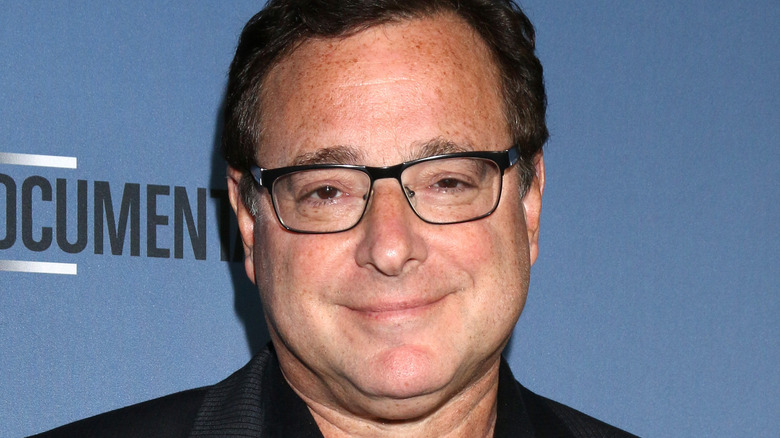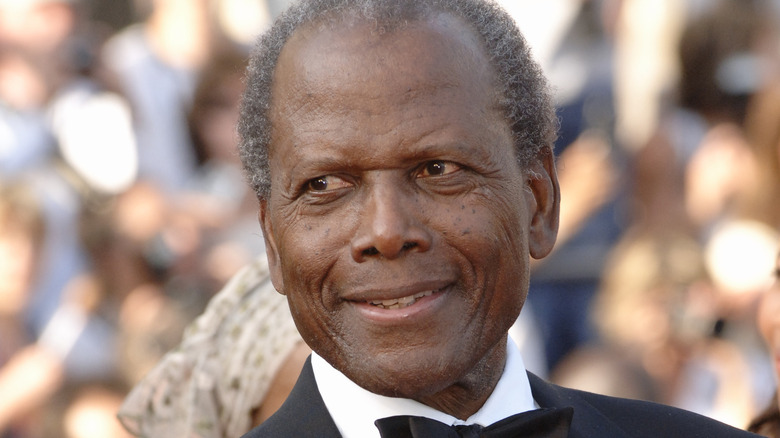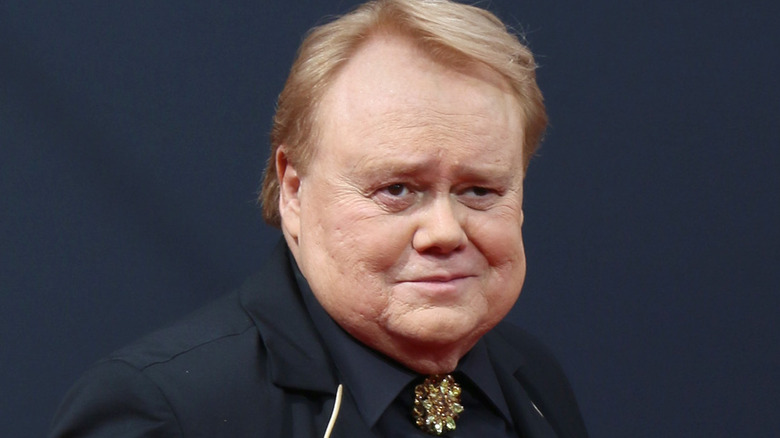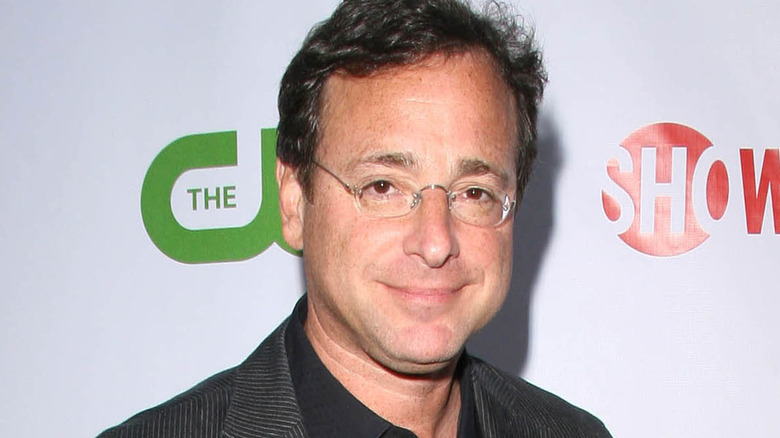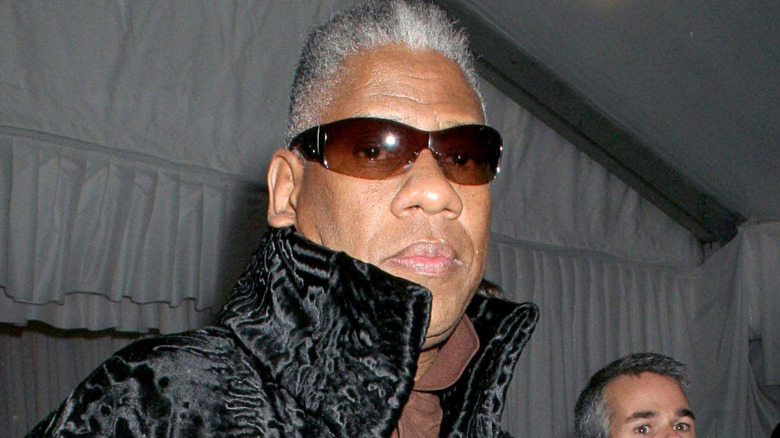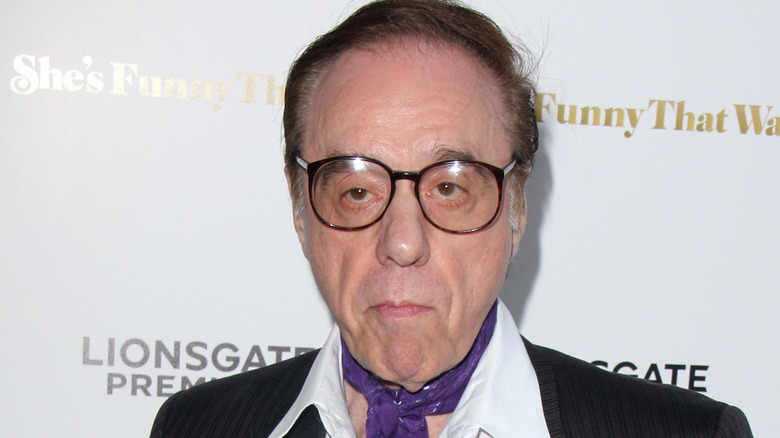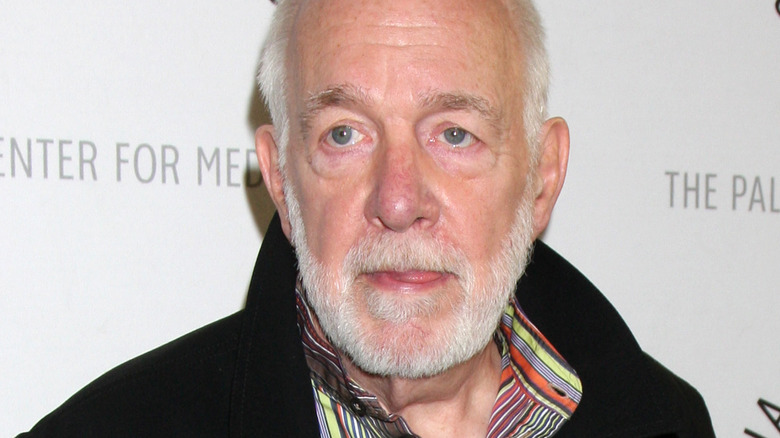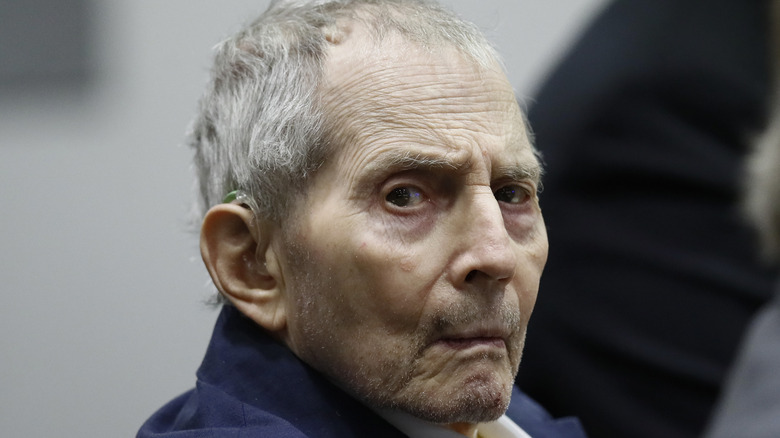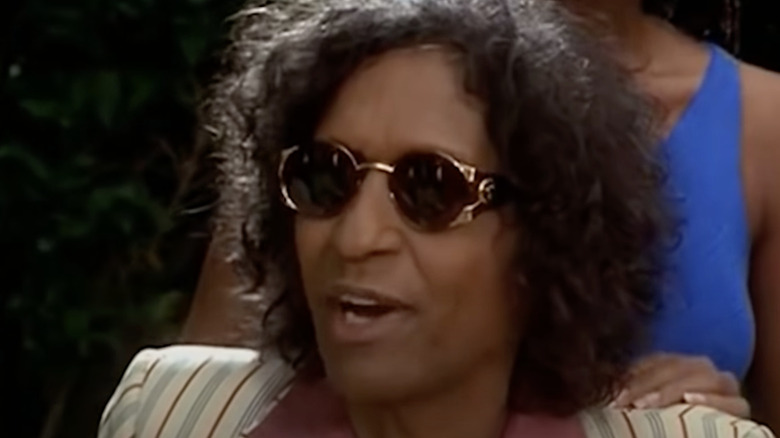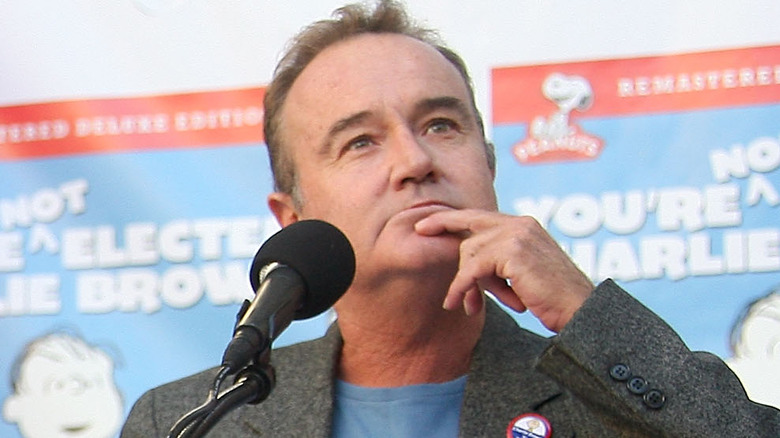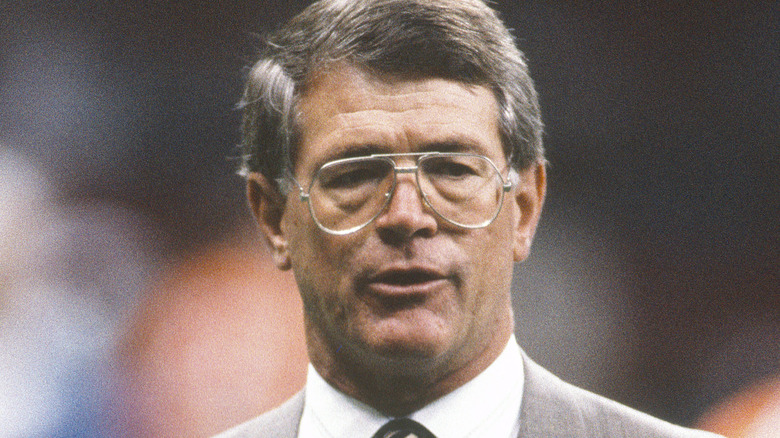Every Major Death In January 2022 Explained
January is a time of newness or at least rebirth. Observed as the start of a new calendar year in most of the world, it's a month full of promise, as billions look forward to starting anew, changing themselves, or at least hoping that this new annum will be a little bit better or different than the last, personally or globally.
It's human nature both to plan and embrace change, but dying is also, tragically, human nature, and it's the great equalizer that makes our relationship with time and making the best of things so deep and complicated. Time marches on each January, and the specter of death marches along in lockstep, ending the lives of many when so many others are considering it a season of new life and change. People around the world died in January 2022, among them famous, notable, creative, and Earth-changing figures, who were larger than life while alive and will continue to be so after. Here are all the most notable celebrity deaths of January 2022.
Sidney Poitier
High-profile and complex roles for Black actors were almost nonexistent until Sidney Poitier forced a change. Raised in the Bahamas, according to CNN, Poitier moved to the United States at age 15 and worked with the American Negro Theatre in New York, which led to roles on Broadway and in Hollywood movies. In 1960, he earned a Tony nomination for the iconic "A Raisin in the Sun," and on film he co-starred in several well-regarded hits, like "Blackboard Jungle," "Cry, the Beloved Country," and the race relations thriller "The Defiant Ones," for which Poitier became the first Black man nominated for the Best Actor Oscar.
In 1964, he'd be the first Black actor to win that category, for "Lilies of the Field." Poitier was active in the civil rights movement, and he used his work to challenge American racial dynamics, particularly in the Deep South crime saga "In the Heat of the Night" and the interracial romance comedy "Guess Who's Coming to Dinner." Later in his career, Poitier would move into TV, scoring Emmy nominations for portraying civil rights icons Thurgood Marshall in "Separate but Equal" and Nelson Mandela in "Mandela and de Klerk."
Latrae Rahming, director of communications for the prime minister of Bahamas, reported to the Associated Press that Poitier died in his Los Angeles-area home on January 6, 2022. According to the death certificate, procured by CNN, the actor died of heart failure, with health issues including prostate cancer and Alzheimer's-related dementia listed as contributing causes. Poitier was 94.
Louie Anderson
Perhaps the definitive stand-up comic of the 1980s stand-up comedy boom, Louie Anderson became one of the most prominent and popular funny guys in the world. Over thousands of dates and hundreds of appearances on talk shows, game shows, and cable stand-up TV shows, Anderson earned a reputation as a quick-witted, self-deprecating comic, poking particular fun at his weight, his dysfunctional upbringing, and his Midwestern background. Anderson parlayed that success and popularity into movies and TV, with showy roles in "Ferris Bueller's Day Off" and "Coming to America" and creating and starring on two titular TV shows, the short-lived sitcom "The Louie Show" and the animated "Life with Louie," the latter of which won him two Daytime Emmy Awards for voice acting. Never not on the comedy and touring grind, Anderson made a major return to TV in 2016 on "Baskets," a quirky, poignant dramedy in which he played the sad-but-sunny mother of Zach Galifianakis' character. The role won Anderson another Emmy Award.
Anderson died in the early morning hours of January 21, 2022, his publicist confirmed to Deadline. Earlier in the week, via TMZ, he was admitted into a hospital in Las Vegas for treatment of a particularly aggressive form of blood cancer called diffuse large B cell lymphoma. He was 68.
Meat Loaf
Meat Loaf used his big hard rock voice to improbably make smash hits with lyrically dense songs that sounded like they could have come from operas or Broadway musicals. Born Marvin Lee Aday, per Rolling Stone, Meat Loaf (he acquired the nickname as a kid owing to his large stature) met composer Jim Steinman in the early '70s on a musical called "More Than You Deserve," establishing a long and fruitful creative partnership. After appearing in "The Rocky Horror Picture Show" as biker Eddie, Meat Loaf's interpretation of Steinman's bombastic, theatrical work, "Bat Out of Hell" hit stores in 1977 and generated classic rock radio staples in "Paradise by the Dashboard Light" and "Two Out of Three Ain't Bad."
After losing his voice and a falling out with Steinman, Meat Loaf faded into obscurity in the '80s, only to re-merge in 1993 with the Steinman-written "Bat Out of Hell II," featuring the epic No. 1 single "I'd Do Anything for Love (But I Won't Do That)."
Aday's family broke the news on the official Meat Loaf Facebook page that the singer had died on January 20, 2022. "Our hearts are broken to announce that the incomparable Meat Loaf passed away tonight surrounded by his wife Deborah, daughters Pearl and Amanda and close friends," the statement read. According to TMZ, Aday had canceled engagements earlier in the week after contracting COVD-19, which quickly turned serious. Meat Loaf was 74.
Bob Saget
A television fixture for decades, Bob Saget was a beloved TV sitcoms dad, starring as sweet, befuddled, sympathetic single father Danny Tanner on "Full House" from 1987 to 1995, a role he reprised on the reboot "Fuller House." Concurrent with his time on "Full House," Saget was also all over "America's Funniest Home Videos." On this one of the first network reality shows, Saget introduced clips sent in by viewers, goofed off with the studio audience, and provided silly voiceovers. After that, he spent another nine years in sitcom land, narrating every episode of "How I Met Your Mother." On the opposite side of the spectrum from squeaky clean network comedy guy, Saget was also one of the most foul-mouthed comedians working the club and theater circuit — humor that he sampled on his Comedy Central roast, in a cameo in "Half Baked," and a teller of the dirtiest joke of all time in "The Aristocrats."
According to TMZ, Saget performed in Jacksonville, Florida, on the evening of January 8, 2022, and the next day he was found dead in his room at the Ritz-Carlton Hotel in Orlando. People reported that Saget missed checkout time and was discovered by housekeeping staff in his bed. According to the Associated Press (via Orlando's ABC 7), a sheriff's report indicated no evidence of foul play, drug use, or trauma, and the local Office of the Medical Examiner would conduct an autopsy. Saget was 65.
Ronnie Spector
When considering the sound and look of the pop/rhythm and blues "girl groups" of the 1960s, the trio known as the Ronettes are the quintessential act — and Ronnie Spector the focus of the act. She was the lead singer of the group, according to the New York Times, formed by her eventual husband, Phil Spector. The former Veronica Bennett, with her sister, Estelle, and cousin, Nedra Talley, sang soulfully and passionately of love, romance, heartbreak, and more on classic hits like "Be My Baby," "Baby I Love You," and "Walking in the Rain," and contributed takes on "Sleigh Ride" and "Frosty the Snowman" to the modern Christmas canon. After exiting a troubled and abusive marriage to Phil Spector, Ronnie Spector had a big comeback hit in the form of a "Be My Baby"-referencing feature on Eddie Money's 1986 hit "Take Me Home Tonight." As part of the Ronettes, Ronnie was inducted into the Rock and Roll Hall of Fame in 2007.
On January 12, 2022, the Associated Press reported that Ronnie had died. The death, as revealed by the singer's family in a statement on her website, followed "a brief battle with cancer." Ronnie Spector was 78.
Andre Leon Talley
It's not a stretch to say that anyone who bought clothes in the U.S. or Europe from the 1970s onward wasn't somehow influenced in their choices by André Leon Talley. As a fashion historian, curator of style, and writer and editor for several of the world's biggest fashion magazines, his tastes and direction shaped what millions wore. According to the New York Times, Talley was a receptionist at Interview, a bureau chief for Women's Wear Daily, and creative director and editor-at-large for Vogue. Talley consulted for Vogue boss Anna Wintour, dressed Michelle Obama, advised designer Oscar de la Renta, mentored Naomi Campbell, acted as artistic director for Zappos, and was highly active at the Savannah College of Art and Design. A tall man with a huge personality, Talley got a lot of attention, given to wearing capes, large hats and elaborate gloves, particularly when he appeared on television, like when he was a judge on "America's Next Top Model."
A source close to the situation told TMZ that Talley died on January 18, 2022, at a hospital in White Plains, New York. According to People, the fashion icon had been suffering from an as-yet unidentified illness before he died at age 73. The Washington Post later reported that Talley had several chronic health issues, including asthma, and that he'd contracted COVID-19 a few days before his death.
Peter Bogdanovich
Peter Bogdanovich broke out in the early 1970s as a crucial member of the "New Hollywood" school, a collective of filmmakers who held up a director as the chief artist and architect of a movie. Alongside Francis Ford Coppola and Robert Altman, Bogdanovich wrote and directed classic films of the period, forward-thinking but old-fashioned hits like "The Last Picture Show" and "What's Up, Doc?" A recognizable figure and bon vivant in Hollywood, scandals and tragedy derailed his promising filmmaking career somewhat, when he left his wife for "Last Picture Show" star Cybill Shepherd and had an affair with Playboy Playmate Dorothy Stratten, murdered by her husband before the release of her collaboration with Bogdanovich, "They All Laughed." The director was also an actor, racking up dozens of mostly supporting roles, notably recurring on "The Sopranos" as Dr. Jennifer Melfi's analyst.
Bogdanovich's daughter, Antonia Bogdanovich, told The Hollywood Reporter that the filmmaker died in the early minutes of January 6, 2022, at his Los Angeles home. According to a statement released by Bogdanovich's family to media outlets, the director died from complications of Parkinson's disease, a degenerative neurological condition. Bogdanovich was 82.
Howard Hesseman
A lot of culture erupted out of San Francisco in the 1960s, including improv comedy via the Committee, a troupe that included Howard Hesseman among its original members, according to Rolling Stone. Hesseman knocked around TV and the indie movie circuit in the '70s before landing his breakout role on the radio-based sitcom "WKRP in Cincinnati" as burnout gonzo disc jockey Dr. Johnny Fever. In the four years that the acclaimed sitcom aired on CBS, Hesseman was the only member of the ensemble cast to score Emmy nominations (two, in 1980 and 1981). A few years after that series ended, Hesseman was back on TV with the vehicle "Head of the Class" as Charlie Moore, a high school teacher and wise mentor to a group of advanced students. Four years into the show, Hesseman left the series because he was unhappy with the material and returned to work as a character actor, reports Deseret News.
Hesseman's wife, Caroline Ducrocq, told The Hollywood Reporter that the actor died on January 29, 2022. In the summer of 2021, Hesseman underwent colon surgery, and he suffered complications that directly led to his death at the age of 81.
Robert Durst
Robert Durst was just one part of the Durst Organization, one of the most powerful and wealthy land development businesses in New York City in the 20th century. In 1982, his notoriety would overshadow his family's stature. According to Time, Durst's wife, Kathie McCormack, disappeared. Despite heavy suspicion from authorities that Durst committed murder, he never stood trial. Prosecutors also suspected that in 2000 Durst shot and killed his close friend, Susan Berman, at her home in Los Angeles to prevent her from telling police he'd killed his wife. Durst subsequently fled to Texas and killed a man, and was acquitted following testimony that the death was an accident following a struggle for a gun.
The saga of Durst was revisited in the 2015 HBO documentary series "The Jinx," which ended with the subject, seemingly unaware his microphone was on, mutter to himself, "You're caught!" and "Killed them all, of course." In September 2021, Durst was convicted in the death of Berman, with prosecutors then indicting him for the murder of McCormack.
Prior to his trial, according to NPR, Durst had been diagnosed with bladder cancer, and he was in such a weakened state that he attended court proceedings in a wheelchair wearing his prison uniform, physically unable to change into a suit. Two days after he was sentenced to life in prison for his role in Berman's death, he was hospitalized for COVID-19. On January 10, 2022, Durst died in a prison hospital in Stockton, California. He was 78.
Max Julien
In the late 1960s and early 1970s, Max Julien, a classically trained actor (per NPR) who's appeared in many off-Broadway theatrical productions, was instrumental in launching a film movement that made strides in getting more Black people and their stories on the screen. In 1968, he starred in "Uptight," a provocative and controversial film about a Black social revolutionary. "I didn't mind being called a militant, because I am a militant," Max later told BET about his motivations. Five years after "Uptight," he played an ambitious, charismatic street criminal named Goldie in "The Mack," one of the first most influential films in the crime-laced Blaxploitation genre. Max also co-wrote the Blaxploitation classic "Cleopatra Jones" and worked as a fashion designer and sculptor.
Early on January 1, 2022, according to TMZ, Julien's wife, Arabella Julien, discovered the actor unresponsive. After being transported to Sherman Oaks Hospital in Southern California, per The Hollywood Reporter, Max died. Arabella later confirmed to the New York Times that the cause of death was cardiopulmonary arrest, or sudden heart failure. Julien was 88.
Peter Robbins
Peter Robbins' work as a juvenile voice actor in the 1960s is among the most enduring and enjoyed work in TV history. In 1965, 9-year-old Robbins voiced Charlie Brown in "A Charlie Brown Christmas," the classic Christmas special and the first animated work based on the popular "Peanuts" comic strip. He reprised the role of the incompetent young sad sack in five more specials (including "It's the Great Pumpkin, Charlie Brown") and the 1969 feature film "A Boy Named Charlie Brown." After walking away from acting in 1972, Robbins worked in real estate, hosted a talk radio show, did a couple of stints behind bars, and coped with mental illness and addiction, according to Rolling Stone.
On January 25, 2022, Fox 5 San Diego reported that Robbins had died the week before. Fox 5 reporter Phil Blauer was close with Robbins, first meeting him during a jailhouse interview after the actor had made criminal threats against the San Diego County sheriff and visiting him during a rehab stay. In 2019, a just-paroled Robbins told Fox 5, "I would recommend to anybody that has bipolar disorder to take it seriously because your life can turn around in the span of a month." Robbins' family told Blauer that the voice actor took his own life. He was 65.
If you or anyone you know is having suicidal thoughts, please call the National Suicide Prevention Lifeline at 1-800-273-TALK (8255).
Dan Reeves
Dan Reeves was an NFL lifer, devoting the whole of his adult life to the game of football. He found success at every level, too. According to ESPN, Reeves participated in nine Super Bowls, variously as a player, assistant coach, and head coach. As a running back for the Dallas Cowboys, he helped win the 1972 Super Bowl, his last season in the league. He immediately joined the Cowboys' coaching staff as an assistant and assisted the team in three Super Bowl appearances, winning in 1978. In the early '80s, Reeves was named the head coach of the Denver Broncos, guiding the team to the Super Bowl in the 1986, 1987, and 1989 seasons. Named Coach of the Year in 1993 and again in 1998 during a stint with the Atlanta Falcons, Reeves finished his career with a 201-174-2 record, the ninth-winningest coach in NFL history.
On January 1, 2022, Reeves died at his Atlanta home, according to the Associated Press (via ABC News). According to a statement released by his family and a former Atlanta Falcons media director, Reeves died from complications of dementia. He was 77.
